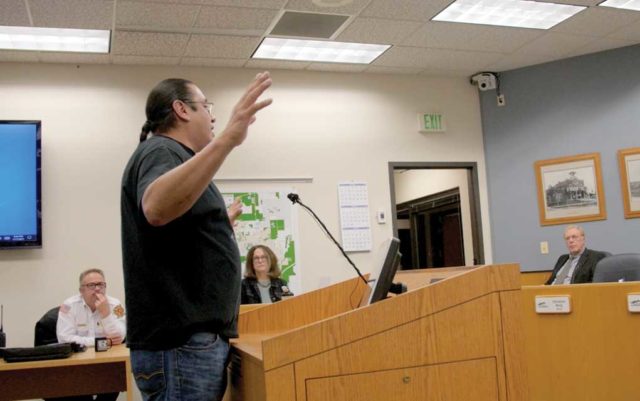
Some citizens of Lafayette never accepted the State of Colorado’s claims of preemption or the court’s dismissal of their community’s groundbreaking 2013 vote to ban fracking within their town’s city limits. So now these creative citizens are looking for another way to protect their community from the industry they claim will contaminate their air and water while hastening climate change.
On Tuesday, January 17, they made their case before the Lafayette City Council for legalizing the right of every Lafayette citizen to use “non-violent direct action” to enforce their right to a healthy environment and community self-government.
In front of an overflow crowd, including representatives from the oil and gas industry, proponents of a proposed ordinance titled Climate Bill of Rights articulated that direct action is the last thing standing between the local environment and the hazards of fracking. After approximately three hours of impassioned public comments, the Council tabled a vote until an unknown future date due to three of the seven council members not being in attendance.
If the Council eventually votes in favor of legalizing “peaceful direct action,” Lafayette would be following in the footsteps of Grant Township in Pennsylvania, which passed a similar ordinance in May 2016. For Grant Township, it was wastewater injection wells and the state of Pennsylvania’s refusal to honor their desire to ban such injection wells that was the impetus for legalizing direct action. Such wells are used to dispose of the oil and gas industry’s produced water which contains fracking fluid contamination as well as numerous naturally occurring contaminants such as mercury and radioactive waste. Injection wells have also been proven to cause earthquakes.
The Lafayette City Council’s consideration of its similar ordinance comes at a time when the industry has acknowledged that as many as 1,800 new wells could eventually be horizontally drilled and hydraulically fractured in Boulder County’s shale formations.
Lafayette originally voted to ban fracking through a Community Rights Bill, which passed with 60 percent voter support in 2013. That effort was quickly met with a lawsuit filed by the Colorado Oil and Gas Association (COGA). Both Grant Township and the citizens of Lafayette have been aided throughout their ordinance process by the Community Environmental Legal Defense Fund (CELDF), which has offered pro-bono legal services to the Lafayette City Council for any further legal action that could be required as the result of passing the Climate Bill of Rights ordinance.
For the members of the grassroots environmental and human rights group East Boulder County United (EBCU), which was founded in 2012 and has co-authored the new proposed ordinance with CELDF, opposition to fracking is viewed as a matter of defending human rights to clean air and water and a healthy climate. Cliff Willmeng, a founder and leader of EBCU, said after the meeting, “We look at these rights as inherent to the whole Front Range and all of these expectations will be placed firmly across the dais of the Boulder County Commissioners. It doesn’t make sense that Lafayette doesn’t have a well if Boulder County has 1,800 of them. Our intention is to protect both of them. When we started this in 2012, we knew that the laws were unjust and our efforts had to bring that fact to the light of day rather than bargaining or negotiating with that fact. We’ve never wavered from that and we knew that it would come to the moment that citizens would have to place themselves between those drills and the local environment and that’s the stage we’re at right now. The intent of the Climate Bill of Rights and Protections is to enlist the support of the local government in exactly that.”
If the ordinance passes, it would forbid any law enforcement personnel employed by the City of Lafayette from “arresting or detaining persons directly enforcing this law” via direct action.
Willmeng also said that he has led three filled-to-capacity civil disobedience trainings in the past month with 40-plus people in each session. These trainings have been hosted on a volunteer basis by local businesses in Lafayette and Longmont. More trainings are being planned. Willmeng’s mother, Merrily Mazza, is a member of Lafayette City Council and supports the legalization of direct action to empower her constituents to protect their community and environment from fracking.
Other speakers at the meeting cited historical examples of peaceful civil disobedience as a critical legacy of the United States’ most significant fights for justice, including the abolition of slavery, women’s suffrage, African-American voting rights and LGBTQ equality. A Lakota man and veteran of the Iraq War, Doug Good Feather recounted the feeling of putting his hands in the air at the front lines of the movement at the Standing Rock Indian Reservation — where he grew up and returned to recently as a “water protector” protesting the Dakota Access Pipeline — only to be shot at with rubber bullets, concussion grenades and tear gas. He said that, as a United States Army combat veteran, he feels that the Iraq War is here now.
Opponents of the ordinance cast its supporters as “radicals” and “hypocrites” and claimed the ordinance would be a potential threat to business and the rule of law. A representative and attorney for COGA condemned the bill. Lafayette City Attorney David Williamson suggested earlier this month that much of the bill’s language was “unenforceable” due to state law.
Towards the end of the evening, John Lamb, a retired Boulder Valley School District teacher and musician from Lafayette, pulled out his harmonica and played the working class ballad, “Which Side Are You On?” He was joined by several women singing along with lyrics specific to Lafayette. Many in the audience joined in. Three of the four councilmembers acknowledged it was a moving moment.














